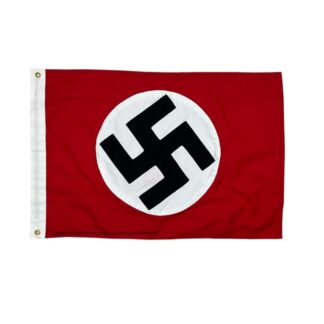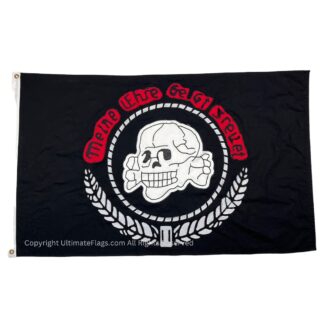“German Nazi War Flag 3′ x 5′ Swastika Flags for Sale” has been added to your cart. View cart
Product Categories

Nazi Flags For Sale
Frequently Asked Questions About Nazi Germany Flag & Swastika
- What is the origin of the swastika symbol?
- When was the Nazi flag first adopted?
- Who designed the Nazi flag?
- What do the colors red, white, and black represent in the Nazi flag?
- How and when did the Nazi Party use the swastika as their emblem?
- What was the “Reich and National Flag” of Nazi Germany?
- What was the difference between party flags and national flags in Nazi Germany?
- What is the “Reichsflagge” vs. the Nazi flag?
- What was the legal status of the Nazi flag after 1945?
- Are there bans on Nazi symbols including the Nazi flag today?
- What is the “Blutfahne” (Blood Flag)?
- What proportions and design rules governed the the Nazi flag?
- How did Hitler describe the design process of the flag in Mein Kampf?
- What was the role of the Nazi flag in propaganda and rallies?
- Did the Nazi flag fly on military ships and bases?
- What versions or variants of Nazi flags existed (war ensigns, banners, etc.)?
- How did the rise of the Nazi flag relate to the Weimar Republic flags and imperial German flags?
- What happened to Nazi flags after Germany’s surrender in 1945?
- How are Nazi flags treated in museums and collections today?
- What significance does the Reich Flag Act of 1935 have?
- Were there official laws regulating the display of the Nazi flag?
- How is the Nazi flag used by extremist or neo-Nazi groups today?
- Why is the Nazi flag so controversial?
- What is the difference between the Nazi flag and the Reichskriegsflagge (war flag)?
- What are the banned status and legal punishments in Germany for Nazi flags?
- Did Nazi Germany use multiple flags for different organisations (SA, SS, etc.)?
- How did Allied forces treat or capture Nazi flags during WWII?
- How is the Nazi flag depicted in film, media, and historical reenactment?
- What is the meaning of “Hakenkreuz”?
- How has the perception of the swastika flag changed over time?
What is the origin of the swastika symbol?
The swastika is an ancient symbol used in many cultures—India, Asia, Europe—for thousands of years. It originally meant well-being, good luck, or prosperity.When was the Nazi flag first adopted?
The Nazi Party first adopted their flag in 1920 as the party flag. It later became one of the national flags after Hitler took power.Who designed the Nazi flag?
Adolf Hitler himself dictated the design. He chose the red background, white disc, and black swastika as combinations that would stand out and evoke certain emotions.What do the colors red, white, and black represent in the Nazi flag?
Red symbolized social thought, white symbolized national idea, and the black swastika was meant to represent Aryan identity and struggle.How and when did the Nazi Party use the swastika as their emblem?
Adopted in 1920, the swastika featured prominently in all party materials and became the state flag in 1935.What was the “Reich and National Flag” of Nazi Germany?
It was the official state flag from 1935 to 1945, featuring the swastika symbol on a red background.What was the difference between party flags and national flags in Nazi Germany?
Initially distinct, the party flag became the national flag after 1935. Party banners included more variations for SA, SS, and Hitler Youth.What is the “Reichsflagge” vs. the Nazi flag?
The Reichsflagge referred to older German flags (like Imperial Germany); the Nazi flag replaced them in state use post-1935.What was the legal status of the Nazi flag after 1945?
It was banned in post-war Germany and most countries. Exceptions apply to museums and academic use.Are there bans on Nazi symbols including the Nazi flag today?
Yes. Most European nations have strict laws prohibiting Nazi symbols, including the flag, in public spaces.What is the “Blutfahne” (Blood Flag)?
A revered Nazi Party flag from the failed 1923 coup, allegedly stained with the blood of a fallen SA man.What proportions and design rules governed the Nazi flag?
The swastika was tilted 45 degrees inside a white circle on a red field. Official dimensions were standardized.How did Hitler describe the design process of the flag in Mein Kampf?
He explained choosing each element carefully for emotional and symbolic appeal, including color psychology.What was the role of the Nazi flag in propaganda and rallies?
Used to unify supporters, the flag was central to rallies, speeches, and military parades, dominating the visual field.Did the Nazi flag fly on military ships and bases?
Yes. Military versions of the flag were used across naval, air, and land forces.What versions or variants of Nazi flags existed (war ensigns, banners, etc.)?
Variants included naval ensigns, command flags, SS banners, and unit-specific flags with swastikas and eagles.How did the rise of the Nazi flag relate to the Weimar Republic flags and imperial German flags?
The Nazi regime replaced the Weimar republic’s black-red-gold tricolor with the swastika flag, reverting to imperial colors (black-white-red).What happened to Nazi flags after Germany’s surrender in 1945?
They were seized, destroyed, or archived by Allied forces. Possession became illegal in many areas.How are Nazi flags treated in museums and collections today?
Handled as historical artifacts with restricted public visibility and educational disclaimers.What significance does the Reich Flag Act of 1935 have?
It declared the swastika flag the official national flag of Nazi Germany, replacing prior national symbols.Were there official laws regulating the display of the Nazi flag?
Yes. The Nazi regime tightly controlled flag use through propaganda laws and decrees.How is the Nazi flag used by extremist or neo-Nazi groups today?
Often illegally, some hate groups still use it as a hate symbol, though it is banned in many jurisdictions.Why is the Nazi flag so controversial?
It represents hate, genocide, and authoritarianism, and is widely considered one of the most infamous symbols in history.What is the difference between the Nazi flag and the Reichskriegsflagge (war flag)?
The Reichskriegsflagge was a military ensign featuring additional emblems like the Iron Cross and eagle.What are the banned status and legal punishments in Germany for Nazi flags?
Display, sale, or possession of Nazi flags can result in fines or imprisonment unless for historical/educational use.Did Nazi Germany use multiple flags for different organisations (SA, SS, etc.)?
Yes. Each group had custom flags with additional insignias layered onto the swastika symbol.How did Allied forces treat or capture Nazi flags during WWII?
Flags were taken as war trophies, displayed in victory parades, or sent to museums as evidence of regime defeat.How is the Nazi flag depicted in film, media, and historical reenactment?
Its use is regulated. Often shown in educational or documentary content, subject to local law.What is the meaning of “Hakenkreuz”?
It means “hooked cross” in German, referring to the swastika.How has the perception of the swastika flag changed over time?
Once a symbol of luck, it is now widely seen as a symbol of hate, banned in many countries, and tightly regulated.-

German Nazi Party Flag, Historical NAZI Flag with Swastika 3 X 5 ft.
Rated 4.92 out of 5$39.95 -

SS Flag German War Third Reich Flags for Sale – 3 x 5 Standard
Rated 5.00 out of 5Sale!$39.95Original price was: $39.95.$34.95Current price is: $34.95. -

Kriegsmarine Flag German Nazi War flag 1938-1945 3 X 5 ft. Standard
Rated 5.00 out of 5$39.95 -

German Nazi War flag 1935-1938 “Reichskriegsministers” 3 X 5 ft. Standard
Rated 5.00 out of 5$39.95 -

German Nazi War Flag 3′ x 5′ Swastika Flags for Sale
Rated 5.00 out of 5Sale!$44.95Original price was: $44.95.$39.95Current price is: $39.95. -

Nazi Flag – National flag of Germany | Marine Jack Flag or Banner – Cotton – with Swastika 3X5 ft.
Rated 5.00 out of 5$119.95 -

German Nazi Party Flag, Historical NAZI Flag with Swastika 2 X 3 ft. Cotton
Rated 5.00 out of 5$69.95 -

German Totenkopf Flag Panzer Division – 3×5 ft Cotton Embroidered
Rated 5.00 out of 5$69.95 -

Nazi Flag – National flag of Germany | Marine Jack Flag or Banner – Cotton – with Swastika 5X3 ft. with Pole Hem / Sleeve
Rated 5.00 out of 5$129.95 -

German Stazi Ordnungspolizei Police Flag 3 X 5 ft. Standard 3rd Reich
Rated 4.67 out of 5$24.95 -

German Nazi War flag 1938-1945 “Kriegsmarine” 2 X 3 ft. Cotton Embroidered
Rated 5.00 out of 5$59.95 -

German Reichs Labor Service Flag 3 X 5 ft. Standard Horst Wessel
Rated 5.00 out of 5$39.95 -

National flag of Germany and Marine Jack of Germany Flag with Iron Cross 3 X 5 ft. Standard
$39.95 -

German Army WWII Flag – Balkenkreutz 3 X 5 ft. Standard
$24.95 -

German Naval Jack Flag 3 X 5 ft. IRON CROSS Flags Standard
$29.95 -

Nazi Reich Labor Service Flag Horst Wessel – 3 X 5 ft. Standard
Rated 5.00 out of 5$29.95
Showing 1–16 of 20 resultsSorted by popularity


